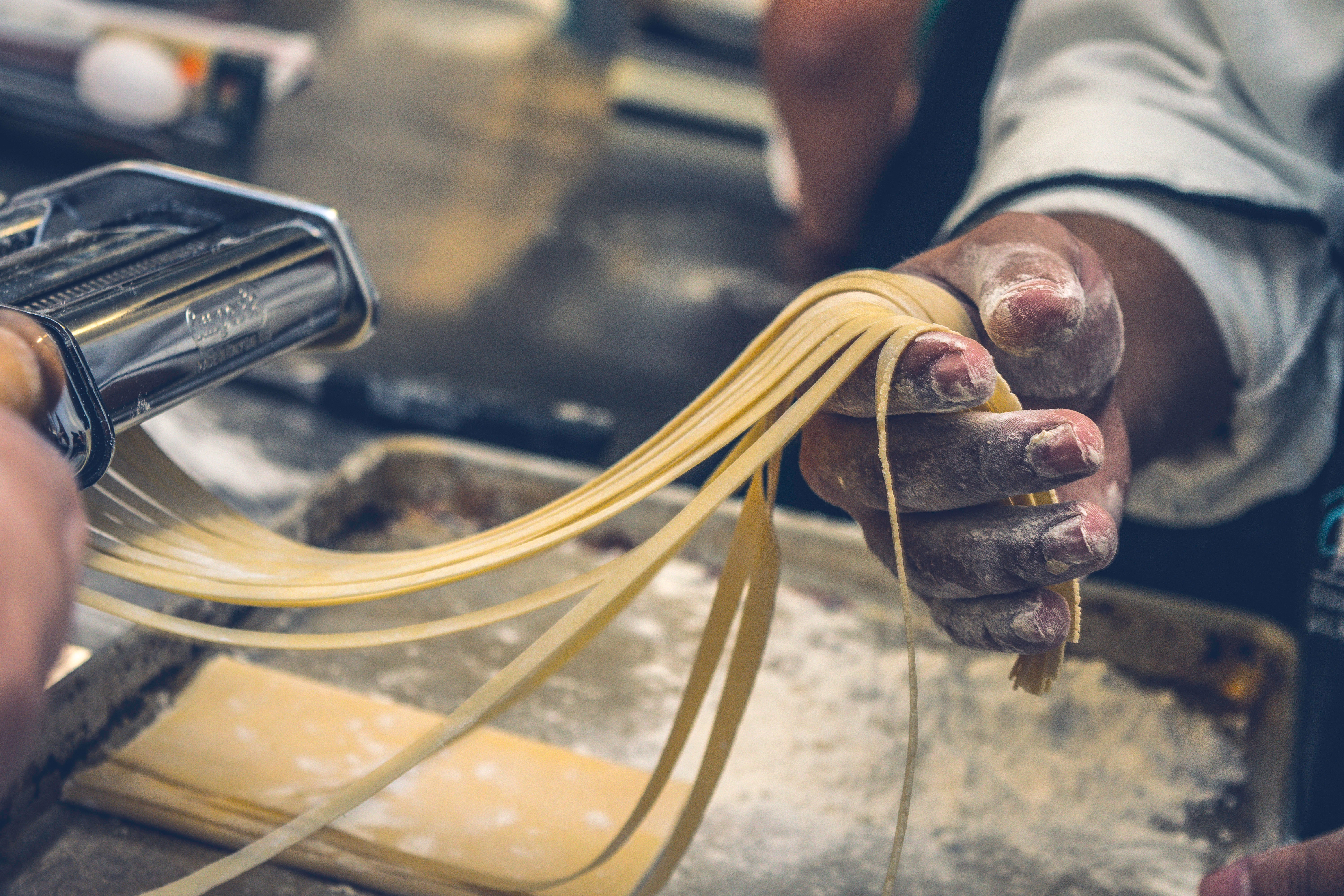Le Mani in Pasta and More in Italian Idioms
 Following our recent posts about German and French idioms, we are now looking at 12 Italian idioms.
Following our recent posts about German and French idioms, we are now looking at 12 Italian idioms.
A few years ago, we lived for several months in Rome, on Via di Genovesi in the Trastevere neighborhood. Our apartment was located directly across from a small restaurant, Le Mani in Pasta (Photo by Jorge Zapata on Unsplash)
It was then a restaurant for locals and none of the waiters spoke English. We loved going there. Our Italian at the time was still quite rudimentary and it was a fun challenge to order from the Italian-only menu. (The restaurant has since expanded and continues to be popular. A nephew who had dinner there with his family early this year liked it very much!)
As new Italian learners, we were puzzled by the form “le mani”, but our tutor explained that “the hand” in Italian is feminine: it's "la mano, le mani". What had obviously thrown us off was that most Italian nouns ending with “o” are masculine.
(Sometimes a look at related languages helps. It's “la main” in French, and - no surprise - “la mano” in Spanish. And even in German, the word hand happens to be feminine: “die Hand”.)
1. Avere le mani in pasta
Idiom: to have a finger in the pie
Literally: to have the hands in dough
Explanation: To be involved, especially in a business matter, or situation of power.
Italian: Essere addentro a qualcosa, in particolare a una questione d'affari, o a una situazione di potere.
2. Avere le mani di pasta frolla
Idiom: to be a butterfingers
Literally: to have pastry-dough hands; "pasta frolla" = shortcut pastry
Explanation: To be someone who drops things they are carrying or trying to catch, to be clumsy, awkward, not careful, not know how to do something or do it badly.
Italian: Essere goffi, impacciati, non accurati, non saper fare nulla o farlo male.
3. Calcare la mano
Idiom: to lay it on with a trowel
Literally: to tread or press down on the hand
Explanation: To exaggerate, especially regarding a punishment or accusation.
Italian: Esagerare in rigore e severità, soprattutto se riferito a una punizione, un'accusa.
4. Non perdere la mano
Idiom: to keep your hand in
Literally: to not lose the hand
Explanation: To not get out of the habit of doing something.
Italian: Non perdere l'abitudine di fare qualcosa.
5. Essere in gamba
Idiom: to be on the ball (Photo by Jeffrey F Lin on Unsplash)
Literally: to be on your feet
Explanation: To be in good health. Also more broadly speaking, to be smart, skillful, expert, efficient.
The first meaning alludes to the fact that a sick person is generally in bed and does not use their legs.
Italian: In buona salute. In senso lato anche intelligente, abile, esperto, efficiente.
Nel significato primo, allude al fatto che una persona malata sta generalmente a letto e quindi non usa le gambe.
6. Fare il passo piu lungo della gamba
Idiom: to bite off more than you can chew
Literally: to take a step longer than the leg
Explanation: To risk going beyond one's own possibilities.
Italian: Arrischiarsi oltre le proprie possibilità.
7. Prendere qualcuno in giro
Idiom: to pull someone's leg, take somebody for a ride
Literally: to take someone for a stroll
Explanation: To make fun of a person, mock, taunt or fool someone.
Italian: Farsi beffe di una persona, burlarla, canzonarla.
8. Tenere un piede in due scarpe
Idiom: to keep a foot in both camps
Literally: to have a foot in two shoes
Explanation: Staying involved in two situations (groups of people, opinions etc), while trying to profit from both of them.
Italian: Barcamenarsi tra due situazioni cercando di trarre profitto da entrambe.
9. Si è dato la zappa sui piedi
Idiom: to shoot yourself in the foot
Literally: He has given himself a hoe on the feet
Explanation: To hurt oneself, to come to harm oneself, particularly in a fit of anger.
It's used especially when someone hurts themselves while thinking they is harming someone else.
Italian: Farsi del male, procurarsi un danno, detto in particolare di chi agisce avventatamente o spinto dall'ira.
Usato soprattutto a proposito di finisce per nuocere a se stesso pensando di danneggiare qualcun altro.
 10. Ormai la frittata è fatta
10. Ormai la frittata è fatta
Idiom: You can't unscramble eggs.
Literally: At this point the omelet has been made. (Photo by Cooker King on Unsplash)
Explanation: An exclamation that expresses resignation about a mess that was made.
Italian: Esclamazione, esprime rassegnazione per un guaio ormai avvenuto.
11. Rivoltare la frittata
Idiom: to turn the tables on somebody
Literally: to flip over the omelet
Explanation: To turn around a discussion, to change a situation to your advantage.
Italian: Rigirare un discorso, capovolgere una situazione a proprio vantaggio.
12. Avere grilli per la testa
Idiom: to have a head full of nonsense
Literally: to have crickets in the head
Explanation: To have strange, bizarre or overly ambitious ideas.
Italian: Avere idee stravaganti, bizzarre o troppo pretenziosi.
Since our stay in Trastevere, Rome, we've continued to have fun learning Italian in various ways and with various programs. Building our own GamesforLanguage site - together with native-language writers and speakers - has been a direct way to keep our hands in the language dough.
And, especially now that travel has become more complicated, our site and our blog has allowed us to connect with an ever growing online language community.
For more Italian Idioms check also The Intrepid Guide or Dizionario modi di dire
